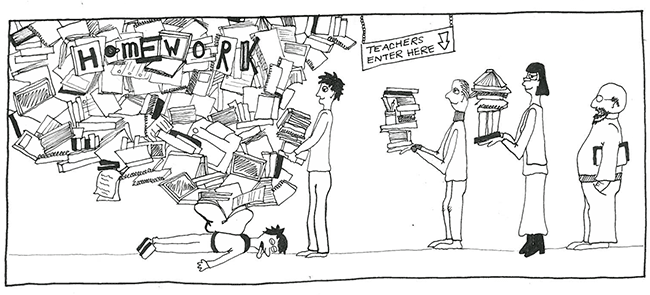OPINION: Too much homework plagues Urban
Homework sucks. It’s not a revolutionary opinion, but no one at Urban is addressing it.
Maybe it’s because we have completely accepted the idea that homework is supposed to dominate our lives. Or maybe we feel too powerless to change Urban’s educational system.
Whatever the reason, it is time for us to talk about homework.
Urban’s homework load is ridiculous. In its mission statement, Urban says it “seeks to ignite a passion for learning, inspiring students to become self-motivated, enthusiastic participants in their education — both in high school and beyond.”
Yet while we need homework to learn, the cost is too high.
Not only do we miss out on important life experiences — trading family dinners for lab reports or bike rides with friends for essays — our learning suffers. Often, we don’t have time to pursue our own academic interests or to research topics further because we’re busy doing assignments, which often have little to no relevance to our lives.
We’re not learning at 2 a.m. when we’re churning out sarcastic essays on how Holden Caulfield’s rebellious nature is a metaphor for the American Revolution. We are simply doing — not learning.
And for what? If homework could improve our conceptual understanding of our course material and teach us how to learn on our own, then it might be okay. But it’s not doing that.
In an interview with the Legend, Denise Pope, a senior lecturer at Stanford University and author of “Doing School: How We Are Creating a Generation of Stressed Out, Materialistic, and Miseducated Students,” there is no relationship between homework load and personal learning.
Even though U.S. homework loads have skyrocketed in the last few decades, “(w)e could not find any evidence that doing homework, at any amount, is connected to teaching people the value of hard work,” Pope said.
She added that “(t)here is a confusion between rigor and load.
“One philosophy is that to prepare students for rigorous colleges, schools need to up the load,” Pope said. “But that’s fallacy. You can rigorously prepare kids, without upping the load.”
Pope did identify “valuable homework,” such as reading a novel for an English class.
If most homework doesn’t help us learn and isn’t making us happy or healthy, why do it? What can Urban do?
We think reform begins with dialogue. Pope suggested having students do their homework during class for one week, so that teachers can see how long it takes. Teachers may not know how long students are spending on their assignments, so students need to respectfully let them know.
After all, schools exist to teach students, not turn them into sleep-deprived zombies. Did we get that right?












